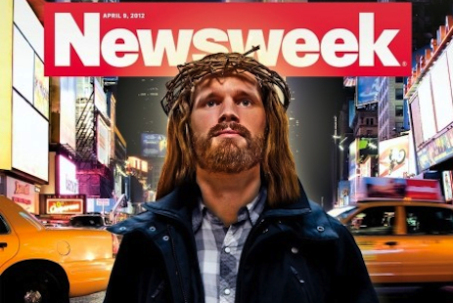I’ve been reading feminist theology lately and learning to view Christianity from angles that I never even imagined. Take, for example, this quote from Rosemary Radford Ruether’s Sexism and God-Talk:
Israel is to make no…graven image of God; no pictorial or verbal representation of God can be taken literally. By contrast, Christian sculpture and painting represents God as a powerful old man with a white beard, even crowned and robed in the insignia of human kings or the triple tiara of the pope. The message created by such images is that God is both similar to and represented by patriarchal leadership…Such imaging of God should be judged for what it is–as idolatry, as the setting up of certain human figures as the privileged images and representations of God.
Ruether claims that this idea of idolatry–that viewing any human image as a literal description of God rather than as an analogy that aids human understanding and breaks earthly power structures–must be extended to verbal imagery as well.
When the word Father is taken literally to mean that God is male and not female, represented by males and not females, then this word becomes idolatrous…The revelation to Moses in the burning bush gives as the name of God only the enigmatic “I am what I shall be.” God is person without being imaged by existing social roles. God’s being is open-ended, pointing both to what is and to what can be.
Ruether’s words challenge Christians to think about what images (visual or verbal) of God we are using, and why we are using them.
Do we call God our king as a way of declaring that our allegiance is not to the flag of an imperial state? Or do we call God our king, and then form God into a tyrant whose decrees sound an awful lot like our own beliefs?
Do we call God our father in order to undermine the patriarchal authority of men who seek to oppress wives and daughters? Or do we call God our father and then insist that mothers (and other women) have no authority in the church, because Christianity has a “masculine” feel?
Many of the verbal images of God we find in the Bible were meant to be taken as analogies that empower us to “obey God rather than man.” They were not meant to be seen as literal ideas of who God is, what God looks like, and especially which of us humans get to be the most god-like.

Our images of God should challenge oppressive power structures, rather than simply providing a mirror for them to gaze into. Those images of God should free us to speak and to serve and to love, not simply entangle us further in the chains that society has already placed upon us.
When our images of God simply become a way of making God look just like oppressive men and husbands and fathers and kings and popes and pastors and white people, and, in turn, making those people look an awful lot like God, maybe we need to repent of our idolatry.











